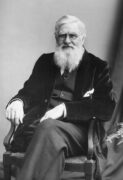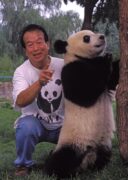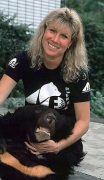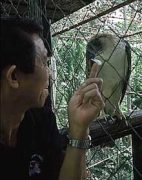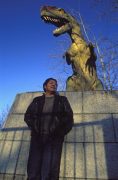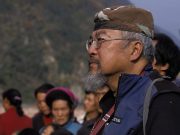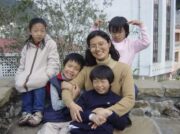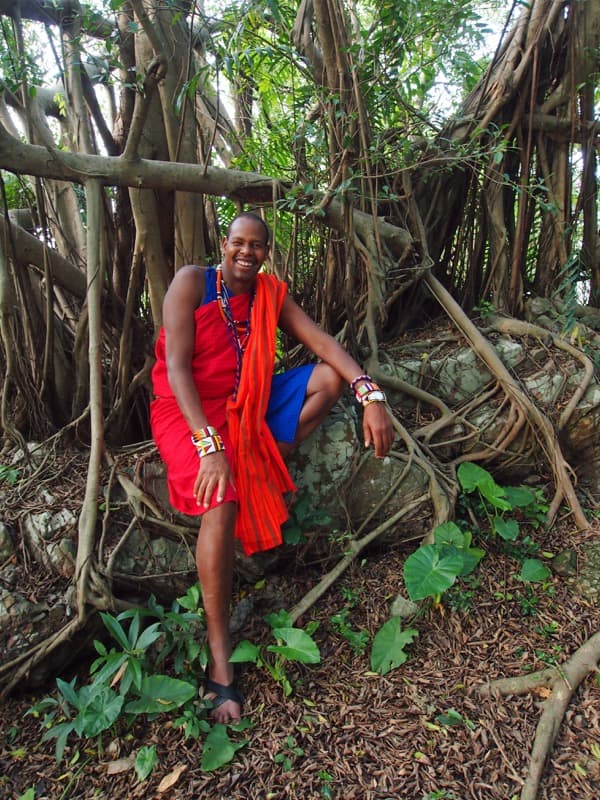
BAD-TASTE BLOOD My home village had about 15 people in it. What we think of as a village is more like a homestead in the west. There was a community around, with about two thousand people living together. My father was a hunter-gatherer and herdsman. My mother followed a Maasai lifestyle centred on cattle. I drank milk and cow blood from an early age. The blood doesn’t taste good – it’s got iron, very metallic. Even with a bit of milk it’s pretty tough to drink, but you can’t say no to your parents.
SCHOOLBOY NOT LION KILLER I didn’t follow the Maasai tradition of killing a lion to prove manhood, but was sent to school. The government rounded up kids, and took them to a big village, where the women moved in. We walked, in a column maybe 1.5km long – including children and cattle. My parents couldn’t read or write, but my father saw the advantage of going to school. They only taught boys, as girls would be someone else’s property. The children’s village was for about 500 families from different places. We played together; it was a lot of fun. Today, many of my classmates are leaders in their communities.
POACHER TURNED RANGER My father was among people who hunted before the British colonial government enforced laws, which protected the Maasai Mara since 1948. He hunted in protected areas, and was leader of some poachers. When rangers came one day, they ran, but he didn’t see why he should run from any many. He was sent to jail for eight years. When he came back, one of the colonial officers – who were very tough – employed him in the wildlife department, as a ranger. He was given a gun, and this was something he liked: he could shoot some animals for food, also for population control. When there were animal controls, all nearby villages were told. Around 200 people might walk to the area and butcher animals, taking the meat legally back home. Among Maasai, you shouldn’t kill animals like elephants and rhinos: it’s taboo. But eland, buffalo and impala, which are like domestic cattle, are accepted.
DANGEROUS BUT RESPECTED After my dad came out of jail when I was about eight, he took me to many places, and I developed a soft spot for animals. Animals can be very dangerous. As you walk, they hear you approach, so you put your brain on another channel. A buffalo broke my father’s hand, and as a young teenager, I saw the broken bones. Growing up, I became accepting of the danger. I developed a fear, which is actually good, part of respect. If you see a buffalo or elephant or pride of lions and have no fear, you’d be pretty stupid. There were human stories. A lion broke all the lower jaw of one man, and others including my father helped him back to the village. You’d see somebody with half a leg, or no hands, elders with big scars. As a little kid listening, I heard mistakes they’d made. There was still cultural respect, not saying let’s buy guns and shoot them all.
ANIMALS ARE SPIRITUAL As children, we grew up with animals, and saw they have cubs, and fawns. Our parents taught us not to kill baby animals. Animals are spiritual, they connect – they know a bad guy, or a good guy. They’re a family, and very forgiving. When my father was hurt by a buffalo, it was like revenge for his hunting. We’ve lost some of this, the spiritual side of animals. I’ve had lions come to my car; they are my friends, my family. I am connected to them. But many people disconnect from the wild world.
A NICE LIFE My father began working for Ron Beaton, who had a small safari company. My father was a guru of Maasai, who knew the best spots by waterholes, and where animals crossed rivers. When my father became too old, Ron asked, “Can you come – as a spotter, on the car roof?” I was about 19, and would get near animals I had never been close to. I was so excited I didn’t sleep the night before. Zebras and wildebeest were not afraid of the car. We saw lions up closed: I was amazed, and got down on the windscreen. I wondered why they didn’t jump onto the car, and listened to Ron talking about the importance of lions in the ecosystem, and what is an ecosystem. I thought: This is a nice life. My world was opened by one guy.
I had worked as a guide for about 20 years before the BBC contacted me. THey wanted me as someone who knows they cultural side, but realised I enjoy cats, and put me with leopards and lions. It was really fantastic, following particular families. One thing that stood out was following a pride of lions for 24 hours, seven days a month. They might sleep, but then get up and go very fast, and you try to catch up. At night, they seem like shadows: they are there, and suddenly no longer there. I got to know their intent, where they might first go one way but plan to go that way. But I did lose them quite a lot; they disappear into the bush. You might know they are here, through smell, hearing them breathing, and talking with low growls.
KILL THRILL During a Human Planet episode on grasslands, the BBC wanted to do something different. It expanded my world to follow guys stealing food from a lion kill. It was amazing, like I was a kid again in my 40s. [Jackson directed the sequence.] I stood there, and didn’t know what would happen: maybe the lions would maul a guy, or a lion would be killed. We had one guy with a gun, following a cameraman on foot.
BEWARE OF MATING LIONS I knew it was unlikely the lions would just charge. There would be a standoff for a few minutes. The most dangerous time to approach lions is when they are mating. They’re fast, and aggressive. The female charges first, and the male follows, wants to fight. If you’re lucky, the female goes, and he’ll follow. When I was young, walking with friends, we were charged by lions. We had spears, and bows and arrows, and shouted to stop them.
OVERPOWERING ROAR The other day, I was walking a client to the tent at night and heard a cat roar. First I looked up, for an airplane. I put my light on, and there was a leopard, right there. It seems as if the roar is from above, or behind you, and it overpowers you.
CHANGING WORLD My father’s world has gone. A lot of things are switching off, and there’s another world, with education, and science. Before, we lived in small communities; we lived together, and loved each other. Now we’re part of the many tribes of Kenya. The population is growing fast. And we’re learning that education can decrease population growth. I talk to a lot communities, including about population, and female genital mutilation. Some ask why this is a problem now, but changing traditions is part of making of a nation
FALLING WILDLIFE POPULATIONS I’ve seen lions decrease big time, cheetah numbers are down massively. Leopards may have increased a little; lion is the their biggest killer and competitor. I don’t wish for the king of the jungle to disappear. In the 1980s there was a lot of elephant poaching, and many went to Tanzania. After an ivory ban in 1989, they increased to amazing numbers, but how they are decreasing again. [After legal ivory trade restarted.] In the last three years, I’ve seen tens of elephants killed. I hope people will stop buying ivory. I don’t want to see ivory here in Hong Kong; I would be so upset.
I LOVE COWS I have about 20 cows, and 50 sheep. If you’re a Maasai without cows, no one will respect you. They roam free. I love cows. They know when I’m home, I call them by names and they come. I pet them. During dry spells we cut leaves from trees for cattle, and wild buffalo feed together with them. You might see a mother and calf, and you know these are desperate times.
TOURISM SUPPORTS CONSERVATION Before, people thought tourists were coming to see poverty. But safaris are educational. With knowledgeable guides, you see how animals live. Elephants plant the forest, spreading big seeds in their dung. And they make paths anybody can follow. Now, tourists are accepted, and bring a lot of money. In the conservancies, tourism money supports communities. Otherwise, the land might have no value, and people would ask: Why keep it for lions? Now, most Kenyans in cities support conservation. A lot of young people know we have to protect wildlife.
Written for South China Morning Post magazine. Jackson’s Hong Kong visit was arranged and hosted by Asia to Africa Safaris.
Top People
Helicopter crews brave mighty winds and waves to rescue seamen during South China Sea typhoons
On the morning of 2 July 2022, as Hong Kong was lashed by gales and rainstorms…
James Reynolds typhoonhunter and volcano videographer
An Eye for the Storm As Super Typhoon Dujuan slammed into northeast Taiwan late on 28…
A Man for All Sequences Frederick Sanger
November 2013 saw the death of a man described by Craig Venter, among the pioneers of…
Blue light at last wins Nobel for LED titans
While the 2013 Nobel Prize in Physics was for an esoteric advance in knowledge — theoretical work…
Genius of the Jungles: Alfred Russel Wallace
Recently came news of a study finding that the distribution and evolution of Galapagos wildlife have…
The butterfly and the remarkable Professor Hofstadter
This spring, there was excitement in the world of physics as a long-predicted butterfly was proved…
James Hansen Godfather of Climate Change retires yet will be very busy
This month [April 2013], climate scientist Dr. James Hansen retired as head of NASA’s Goddard Institute…
Pan Wenshi: Scientist Who Fights for the Pandas
In a cave near a tributary of the Youshui River, Pan discovers Jiao Jiao, an eight-year-old,…
Jill Robinson helping bears
First Jill Robinson was shocked, then she set out to stop the suffering The Great Bear…
Jessie Yu – Hong Kong Single Parents Assoc founder
The best way to get ahead, says this tireless Hong Kong philanthropist, is to help yourself.…
Keeper of the Kings: Captive breeding Philippine Eagles
One man’s perseverance offers hope to a critically endangered bird of prey On a warm, sunny…
Dr Yang Lihe helping former leprosy patients
Dr. Yang Li-he has spent his life helping cure leprosy. Now he is helping former patients…
Dinosaur hunter Dong Zhiming
Unearthing China’s Real Dragons Dong Zhiming, 26, walked atop a low cliff of red and yellow…
Dramatic rescue by brave helicopter crew from roof of blazing Garley Building in Kowloon
Captain Mike Ellis eased the Sikorsky Blackhawk in towards the beleaguered, 16-storey Garley Building, in the…
Mountain Dog and rebuilding schools in China
I’m at a charity ball in Hong Kong, seated among a hundred guests in a bright…
Mother Ko’s fight for justice
The more lawmakers ignored her, the more determined she became to seek justice On a grey,…
SARS doctor and heroine Yannie Soo
A mysterious illness was striking the medical staff down one by one. How could they fight…
Allen Lien
In October 2002, boxes of clothes began arriving in Burkina Faso, a country in West Africa,…
Teacher Lin helps kids in Taiwan
Teacher Lin has a dream, in which more and more needy children find their home sweet…




